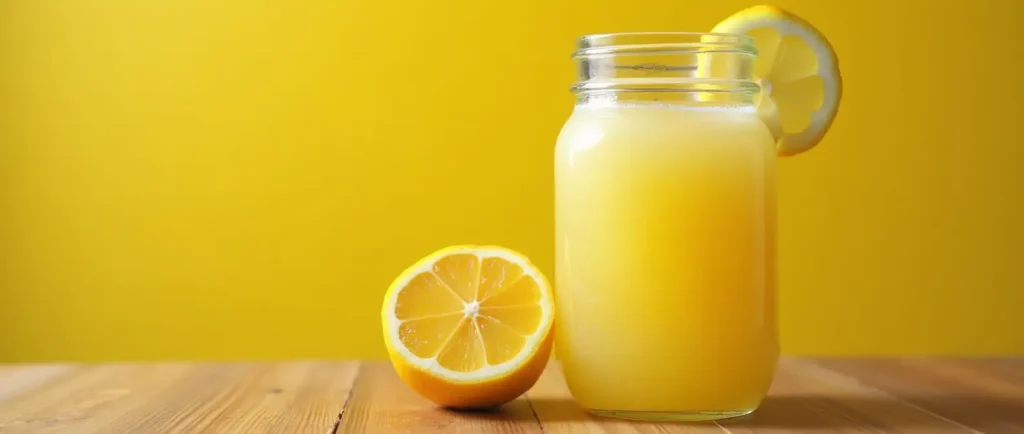Lemon juice, a versatile kitchen staple, is beloved for its tangy flavor and numerous applications. Whether you’re preparing dishes like Easy Mediterranean Diet Recipes or adding a zest of citrus to drinks, it’s a vital ingredient. But, can lemon juice go bad? Like any perishable item, lemon juice has a shelf life. Improper storage can hasten its decline. This guide explores the shelf life, signs of spoilage, and ways to maximize your lemon juice’s freshness.
Why Does Lemon Juice Go Bad?
Lemon juice, whether fresh or bottled, is packed with water and organic compounds. Above all, its natural acidity acts as a preservative by slowing microbial growth. However, this acidity does not completely prevent spoilage. For instance, exposure to air, bacteria, or heat can trigger chemical reactions that degrade the juice. Moreover, fresh lemon juice is more susceptible to spoilage than bottled versions, which contain stabilizers. On the other hand, even bottled lemon juice loses its freshness over time due to natural chemical changes.
In addition, factors like temperature, exposure to light, and inadequate sealing can hasten the decline of both fresh and bottled varieties. Consequently, understanding why lemon juice spoils is essential for safe consumption. If you’re looking for creative ways to use lemon juice before it spoils, recipes like Moroccan Lemon Chicken Tagine provide delicious inspiration. In short, proper storage is crucial for maximizing its shelf life.
Factors Influencing Lemon Juice Shelf Life
Several factors determine how long lemon juice stays fresh. In fact, understanding these factors can help you maximize its usability and prevent waste.
Type of Lemon Juice
For example, freshly squeezed juice has a shorter lifespan than bottled juice with preservatives. Moreover, fresh juice is more prone to spoilage due to the lack of stabilizers and protective packaging. As a result, it requires immediate refrigeration or freezing to remain safe for consumption.
Storage Conditions
In addition, storage plays a crucial role in maintaining lemon juice freshness. Cool and dark environments not only preserve the juice’s flavor but also prevent bacterial growth. On the other hand, exposing it to heat or direct sunlight accelerates spoilage. Therefore, always refrigerate opened bottles or freshly squeezed juice to extend its shelf life.
Preservatives
Preservatives, in contrast, are a game changer for bottled lemon juice. Not only that, they help stabilize the juice, allowing it to stay fresh for extended periods even without refrigeration before opening. In conclusion, the inclusion of preservatives provides convenience and reduces the risk of spoilage, especially for those who use lemon juice sparingly.
For more tips on kitchen efficiency, check out our guide on Homemade Cleaning Solutions that incorporate lemon juice for sustainable cleaning.
How to Detect Spoiled Lemon Juice
Knowing when lemon juice has gone bad is crucial for ensuring safety and flavor. In fact, several indicators can help you determine if your lemon juice is no longer usable. Moreover, paying attention to these signs can save you from consuming something harmful.
Appearance Changes
For instance, cloudiness or sediment often indicates that the juice has spoiled. In addition, visible mold on the surface is a clear sign that it’s no longer safe to use. Above all, never consume lemon juice with any visible growth or discoloration, as this could lead to health risks.
Odor
Fresh lemon juice typically has a tangy and invigorating aroma. However, if the juice emits a sour, musty, or fermented smell, it’s likely spoiled. In contrast, properly stored lemon juice should maintain its fresh scent for the duration of its shelf life. As a result, any unusual odor should be taken seriously as a warning.
Taste
Additionally, spoiled lemon juice often tastes excessively sour, bitter, or even fermented. For example, if your lemon juice doesn’t taste as you remember, it’s better to discard it. Consequently, tasting spoiled juice can ruin your recipes and leave an unpleasant aftertaste.
Packaging Issues
On the other hand, packaging can also provide clues about the juice’s quality. Bulging bottles or leaking seals often indicate microbial activity inside. Because of this, you should avoid using lemon juice from compromised containers. In short, always inspect the packaging before use to ensure it’s intact and safe.
Using spoiled lemon juice can ruin recipes. For example, adding it to dishes like French Onion Beef and Noodles could compromise their taste.
Risks of Consuming Spoiled Lemon Juice
Consuming spoiled lemon juice can pose several risks to your health and culinary experience. In fact, even a small amount of bad lemon juice can have undesirable consequences. Moreover, it’s essential to understand these risks to avoid potential harm.
Stomach Upset
For instance, contaminants like bacteria or yeast found in spoiled lemon juice may cause symptoms such as nausea, vomiting, or diarrhea. In addition, these symptoms can escalate depending on the level of contamination. As a result, even minor spoilage should not be overlooked, especially if the juice smells or tastes off.
Toxic Reactions
Similarly, in severe cases, consuming bad lemon juice can lead to foodborne illnesses. For example, symptoms like fever, abdominal pain, and severe dehydration may occur if harmful microbes such as E. coli are present. Consequently, individuals with weaker immune systems, such as children or older adults, are at a greater risk.
Flavor Ruin
On the other hand, spoiled lemon juice doesn’t just affect your health; it also ruins the taste of your dishes. For instance, if used in marinades, salad dressings, or baked goods, its overly sour or bitter flavor can overpower the intended taste. In contrast, fresh lemon juic-e enhances dishes with its vibrant acidity. As a result, always double-check your juice before adding it to meals.

Storage Tips to Extend Lemon Juice Shelf Life
Proper storage is essential for maintaining the freshness and usability of lemon juice. A few simple practices can significantly extend its shelf life. Moreover, adopting these methods helps preserve the flavor and quality of this versatile ingredient.
Refrigeration
Above all, refrigeration is one of the most effective ways to keep lemon juice fresh. Store it in airtight containers in the refrigerator at 40°F (4°C) to maintain its flavor and prevent spoilage. In addition, freshly squeezed juice should be used within 2-3 days to ensure optimal freshness. On the other hand, failure to refrigerate lemon juic-e may cause it to spoil rapidly.
Freezing
Similarly, freezing lemon juic-e is another excellent storage solution. For example, pour the juice into ice cube trays to create convenient, pre-portioned servings. After that, transfer the frozen cubes into freezer-safe bags to protect them from freezer burn. As a result, the juice can be stored for 3-4 months without losing its quality. In contrast, leaving it unfrozen for too long reduces its usability over time.
Avoid Heat and Light
Additionally, keeping lemon juic-e away from heat and light is critical. Bottled juice should be stored in a cool, dark pantry to maintain its freshness. For instance, direct sunlight or high temperatures can degrade the flavor and encourage microbial growth. Because of this, always ensure that unopened bottles are stored in a shaded area.
To explore similar preservation ideas, read our recipe for Easy Chicken Recipes which highlights ingredients that maintain freshness longer.
Creative Uses for Lemon Juice Before It Goes Bad
Lemon juice is incredibly versatile, and in fact, it can be used for far more than just cooking. Moreover, utilizing it creatively helps you make the most of your supply before it spoils. In addition, these ideas are simple and practical, ensuring nothing goes to waste.
Enhancing Beverages
For instance, a splash of lemon juic can elevate the flavor of water, tea, or even cocktails. In addition, it adds a refreshing tang that complements both hot and cold drinks. As a result, your beverages will taste better and offer a delightful twist.
Natural Cleaning Solutions
Lemon juice is an excellent natural cleaner. For example, mixing it with baking soda creates an effective paste for scrubbing sinks or countertops. Similarly, diluted lemon juic works wonders for removing stains or deodorizing cutting boards. Because of this, it’s a go-to choice for eco-friendly cleaning.
Beauty Applications
On the other hand, lemon juic can be a part of your beauty routine. For instance, it can brighten skin or lighten hair when diluted and applied properly. However, it’s important to use it sparingly and always follow with sunscreen to avoid irritation. As a result, you can enjoy its natural beauty-enhancing properties without harmful side effects.
Culinary Magic
Above all, lemon juic shines in the kitchen. Use it in marinades to tenderize meat or add it to baked goods for a tangy citrus kick. In addition, it’s perfect for preserving the color of cut fruits like apples or avocados. Consequently, it’s a must-have for elevating both savory and sweet dishes.
FAQs: Can Lemon Juice Go Bad?
How do you spot bad lemon juice?
Spotting spoiled lemon juice is crucial for maintaining safety and quality. For instance, cloudiness, visible mold, or an unpleasant, fermented smell are clear indicators of spoilage. In addition, if the juice tastes overly bitter or sour, it’s likely no longer safe to consume. Above all, always inspect your lemon juic before using it in any recipe.
What happens if you consume spoiled lemon juice?
Consuming bad lemon juic can lead to unpleasant consequences. For example, it may cause stomach upset, nausea, or diarrhea due to harmful bacteria or yeast. Moreover, in severe cases, it could result in foodborne illnesses with symptoms like fever and dehydration. As a result, it’s essential to avoid using lemon juic that shows signs of spoilage.
How long does bottled lemon juice last after opening?
Bottled lemon juic typically lasts about 1-2 months after opening when stored properly. In fact, keeping it in the refrigerator at 40°F (4°C) or below can significantly prolong its freshness. In contrast, storing it at room temperature can accelerate spoilage. Therefore, always refrigerate opened bottles and tightly seal the cap to prevent contamination.
Is bottled lemon juice bad for you?
No, bottled lemon juic is not harmful if it’s fresh and properly stored. However, some people prefer fresh lemon juic due to its natural flavor and lack of additives. On the other hand, bottled lemon juic often contains preservatives like sulfites, which may trigger sensitivities in some individuals. In conclusion, bottled lemon juic is safe and convenient for most people when used within its recommended shelf life.
Conclusion: Can Lemon Juice Go Bad?
Understanding whether lemon juice can go bad is essential for maintaining both safety and quality. In fact, knowing the signs of spoilage, such as changes in appearance, odor, or taste, helps you avoid potential health risks. Moreover, you can significantly extend its shelf life by adopting proper storage practices—like refrigeration, freezing, and keeping it away from heat and light.
Above all, fresh lemon juic is a versatile ingredient that enhances meals, cleans surfaces, and even contributes to DIY beauty solutions. In addition, its tangy flavor and natural properties make it an indispensable household staple. As a result, taking steps to ensure its freshness allows you to enjoy its benefits for longer.
For further cooking inspiration, explore trusted resources like Tasty, AllRecipes, and Delish. Their extensive recipe collections ensure that your lemon juic never goes to waste!







